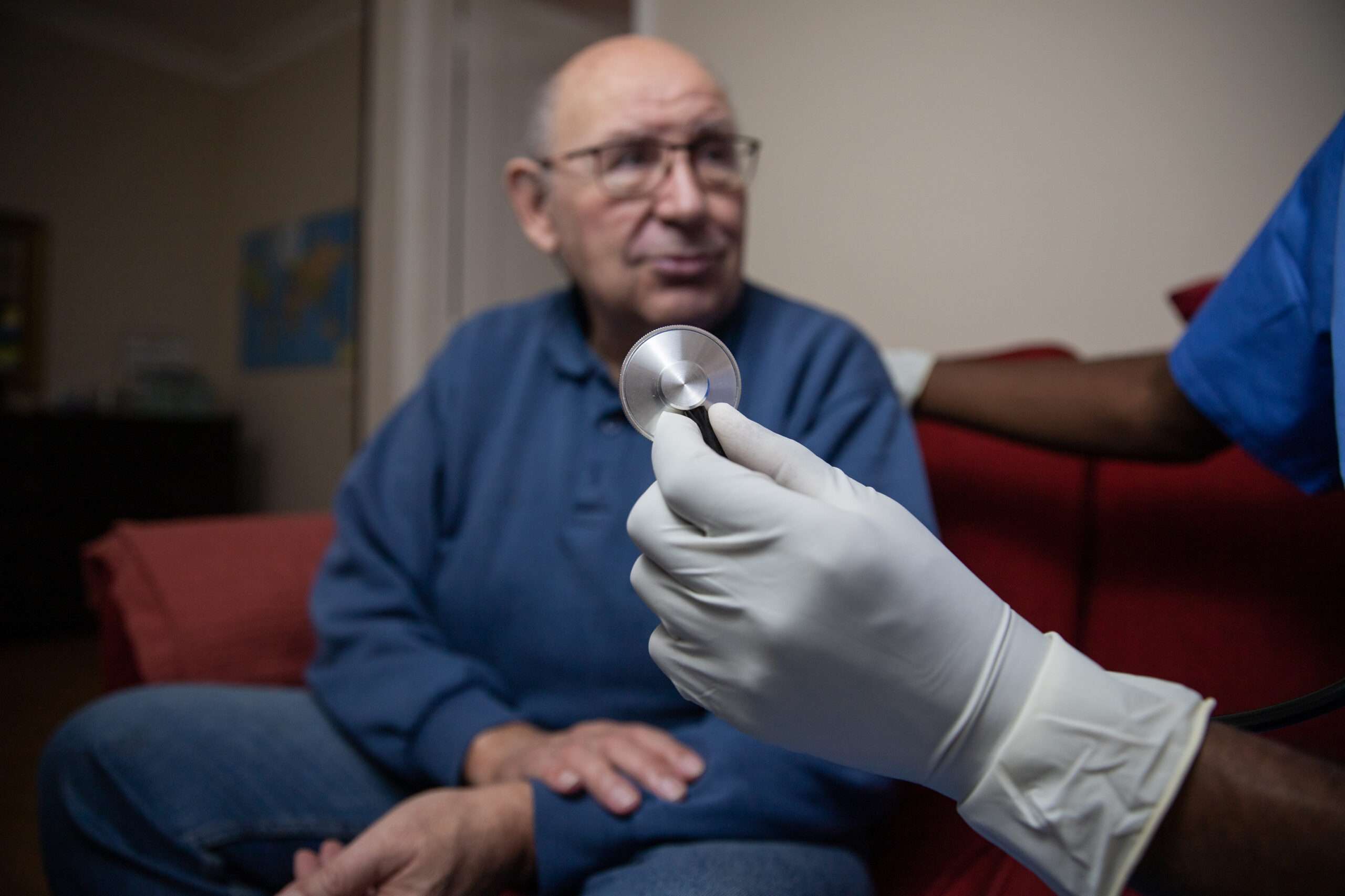As the healthcare industry faces increasing regulatory changes, margin pressures, and rising costs, companies like CVS Health and Humana are feeling the squeeze. Experts emphasize the need for value optimization, with low-cost care settings showing the most potential for success. Inbound Health and Allina Health are leading the way with their innovative Elevated Care at Home (ECH) program. Developed in response to the COVID-19 pandemic, ECH offers an alternative to traditional hospital stays and post-acute care services, improving outcomes while addressing capacity and cost challenges. Together, Inbound Health and Allina Health are transforming transitional care to enhance both quality and affordability.
-
Improving Patient Outcomes with Acute Hospital Care at Home

Preliminary Analysis of Hospital Care at Home Performance Outcomes
This preliminary analysis examines performance outcomes in patients discharged to Inbound Health’s Hospital Care at Home program, which meets CMS Acute Hospital Care at Home requirements, within a Minneapolis-based health system.
Patients in Inbound’s program had a lower 30 day readmission rate compared to matched patients based on severity of illness. Also, the mean length of inpatient stay was shorter with the Inbound Health cohort of patients.
We improved care and created greater efficiency for our patients, families, and healthcare systems.
-
Maximize the 90 Day Acute Hospital Care at Home Extension

The 90-day extension of the Acute Hospital Care at Home (AHCAH) waiver provides hospitals with continued flexibility from the Centers for Medicare and Medicaid Services (CMS), allowing them to deliver certain types of acute care in patients’ homes rather than requiring admission to a traditional inpatient facility.
Originally introduced during the COVID-19 public health emergency (PHE), the AHCAH waiver was designed to help hospitals manage patient surges more effectively, utilizing telehealth and home-based care solutions. Under the waiver, hospitals can treat eligible patients at home with appropriate medical oversight, including remote monitoring and necessary therapeutic interventions, thereby extending hospital-level care beyond the traditional setting.
Key Implications of the 90-Day Extension for Health Systems
Continued Flexibility for Hospitals:
The 90-day extension provides health systems with additional time to integrate home-based care into their operational strategies. This enables hospitals to treat patients who require acute care but do not need full hospitalization, optimizing the use of hospital resources.
The extension also offers hospitals greater flexibility in managing patient volume and capacity, helping to prevent strain on physical facilities—particularly in the face of potential patient surges.
Financial Impact:
Reimbursement and funding: The waiver enables hospitals to receive reimbursement for acute care provided at home, as though the care were delivered in an inpatient setting. These reimbursement rates may be subject to adjustment or extension as policies evolve.
Hospitals can continue billing Medicare for home-based acute care services, which represents a critical revenue stream. If this flexibility is extended or made permanent beyond the 90-day period, it could offer significant financial relief, particularly for hospitals in rural or underserved areas facing resource constraints.
Operational Adjustments:
Health systems may need to invest in infrastructure like telehealth systems, remote patient monitoring technologies, and home health nurse services to comply with the AHCAH requirements.
For hospitals not already equipped for home-based acute care, the extension provides an opportunity to ramp up resources or partner with home health solution providers.
Patient-Centered Care:
The extension allows hospitals to continue to offer patient-centered care by providing more comfortable care options for patients who are appropriate for home care, reducing the risk of hospital-acquired infections and improving patient satisfaction.
Quality of Care and Regulatory Compliance:
Hospitals will need to continue ensuring that the care provided at home meets the necessary clinical standards. Compliance with all applicable regulations and quality of care measures will be crucial to maintain eligibility for reimbursement.
Monitoring and quality assurance processes will remain key, as patients receiving care at home will still require oversight by healthcare providers to ensure their safety and well-being.
Strategic Planning:
Health systems might use the 90-day extension to evaluate the feasibility of incorporating hospital-at-home models into their long-term strategies. For some systems, the waiver could help them test these models on a larger scale to understand the financial, operational, and clinical implications before committing to more permanent changes.
Next Steps
The 90-day extension of the AHCAH waiver provides health systems with a unique opportunity to expand and refine their home-based care services. Inbound Health can be a key partner in this process by offering a comprehensive, scalable solution for delivering acute hospital-level care at home, ensuring regulatory compliance, improving patient outcomes, and optimizing operational efficiency. Our expertise in hospital-at-home care helps health systems confidently navigate this new care model and maximize the benefits of the waiver extension.
Discover what healthcare systems can do during this 90-day period, key insights from Washington officials and staff, and how Inbound Health can support your health system.
Read and download the details below.
-
Hospital-at-Home Saves Both Lives and Money, but Congress Must Act to Keep It Alive

When it comes to ongoing healthcare initiatives aimed at improving care outcomes, the Acute Hospital Care at Home (AHCAH) program exceeds expectations by also increasing patient comfort, lessening the burden on hospitals, and lowering spending.
While the AHCAH program was launched by the Centers for Medicare and Medicaid Services (CMS) in response to the COVID-19 pandemic and its overwhelm of hospitals, the improved outcomes and lower spending seen with the program have lasted even after the pandemic ended. Offering in-patient level care at home allows hospitals to care for more patients, decreases a backlog of filled beds, and lessens the need for unnecessary procedures and treatments resulting from delayed care. The AHCAH program has shown the benefits it offers to the healthcare system, but it will nevertheless expire if Congress does not act by the end of the year.
Extending the AHCAH Program
The AHCAH program has already been extended once; it was initially planned to last only through the pandemic’s emergency period, but the Consolidated Appropriations Act of 2023 extended AHCAH through December 31st, 2024. Since the time of its expiration has arrived, Congress must once again act to keep in action this initiative that improves outcomes while also lowering healthcare costs, a win for patients and carers alike.
While the deadline is quickly approaching, its renewal is not entirely out of the question. The Telehealth Modernization Act of 2024, which has bipartisan support in the House and Senate, includes an extension of the AHCAH waiver through 2029 that is supported by the American Medical Association. The hospital-at-home waiver offers hospitals reimbursement for providing at-home care to their patients with Medicare and Medicaid. The waiver also removes the requirement that a nurse must be present 24/7.
The Impact of AHCAH’s Expiration or Extension
The AHCAH program is no small feat and has become a cornerstone of Medicare programs. There are over 350 approved hospitals across more than 130 health systems that implement this innovative form of care delivery, and the expiration of the AHCAH program could be detrimental to these systems that rely on providing care-at-home services.
All patients can benefit from AHCAH. Rather than overcrowd hospitals, sometimes to the point where patients receive emergency care in hallways because no rooms are available, patients can be moved to their homes to complete the remainder of their care. For the aging population, care at home offers the opportunity for them to age in place, something that three-quarters of those in the United States over the age of 50 desire.
Knowing the universal benefits of the AHCAH, the expiration of this model can hurt all patients, but especially those with dementia, social barriers, and physical/sensory disabilities—for these individuals, care at home can make all the difference in their comfort, adherence to treatment, and treatment success.
AHCAH also offers healthcare workers a glimpse into the lives of their patients, which offers greater insights that can further improve the care they’re capable of providing.
Additionally, care-at-home programs demonstrate their superiority when it comes to lowering spending while improving healthcare outcomes. A report by CMS found that the mortality rate for AHCAH was lower for all 25 Medicare Severity Diagnostic Related Groups (MS-DRGs) they analyzed and significantly lower for 11 of these 25 MS-DRGs. Spending is lower, as well, with care-at-home shown to have lower Medicare spending in the 30 days after treatment for more than half of the top 25 MS-DRGs.
An extension of the AHCAH initiative gives health systems time to implement a care-at-home program or continue improving and expanding those that are already in place. It allows these facilities to provide for patients who can and want to be treated at home, increasing the care capacity of hospitals without increasing the costs required to provide this care.
How Inbound Health Can Help
If the AHCAH program is extended, it will provide your healthcare system with a vital opportunity to bring the benefits of care-at-home to your patient population, and Inbound Health can help.
Inbound Health partners with health systems to build, launch, and operate acute and post-acute care at home programs, allowing you to take the guesswork out of the best way to bring to life a successful AHCAH program that improves outcomes and lowers spending.
When it comes to the AHCAH program, the ball may currently be in Congress’s court, but you don’t have to wait to learn more about how Inbound Health helps health systems.
References
Fact Sheet: Report on the Study of the Acute Hospital Care at Home Initiative | CMS. (2024, November). Cms.gov. https://www.cms.gov/newsroom/fact-sheets/fact-sheet-report-study-acute-hospital-care-home-initiative
H.R.7623 – 118th Congress (2023-2024): Telehealth Modernization Act of 2024. Congress.gov. https://www.congress.gov/bill/118th-congress/house-bill/7623
Hospital at home saves lives and money: CMS report. (2024). American Medical Association; https://www.ama-assn.org/delivering-care/population-care/hospital-home-saves-lives-and-money-cms-report
Davis, M. R. (2022). 77 Percent of Older Adults Want to Remain in Their Homes as They Age. AARP. https://doi.org/1062105/3752820195

